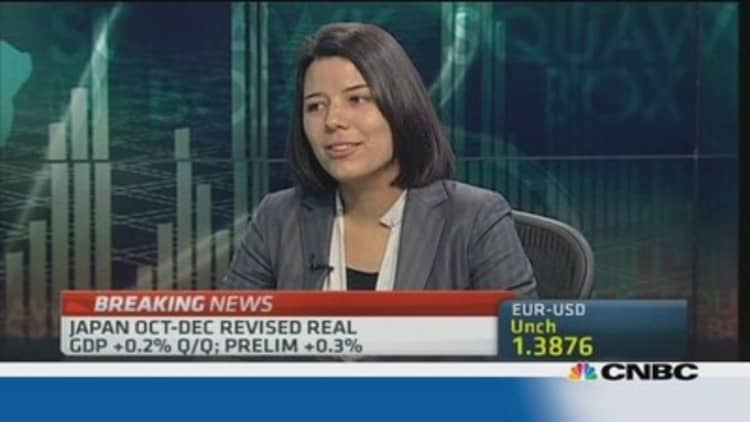
Markets may be looking to Japan's central bank to goose the economy, but policy easing may have reached its limits, with the next recovery phase left in corporate hands.
"Additional easing should undermine the yen and support equities further, but the actions of the Bank of Japan probably matter much less now than developments overseas and in global risk appetite," Capital Economics said in a note. "It is also debatable whether additional monetary easing at this stage would have major benefits."
(Read more: Japan's fourth-quarter GDP revised down)

The Bank of Japan is widely expected to keep its policy unchanged at its meeting this week, despite recent weaker economic data. Japan's economy grew 0.7 percent on-year in the fourth quarter of 2013, revised down from a preliminary reading of 1 percent, data released Monday showed, coming in below economists' expectations, according to Reuters.
Investors have been watching the data closely for signs of the relative success of Abenomics, or the around one-year-old plan from Japanese Prime Minister Shinzo Abe aimed at kick-starting Japan's long-moribund economy out of its decades-long struggle against the pressures of deflation.
(Read more: Why you should be patient with Abenomics)
Despite the scheduled increase in the consumption tax to 8 percent from 5 percent in April, which is expected to dent consumer spending, the BOJ is unlikely to ease further until the third quarter of the year, said Izumi Devalier, a Japan economist at HSBC.
"(BOJ Governor) Kuroda still sounds very confident that inflation is moving in line with the BOJ's expectations," she said. "The BOJ feels it's very important to lift inflation expectations. And that if they ease prematurely it sends the message that they're losing confidence and I don't think they want to project that image yet," she said.
(Read more: Why Japan shares can't get fresh traction)
But she added, the corporate sector is key to continuing the economic recovery and there are real reasons for doubts.
"This cycle currently has stopped with the corporates. It's not going much further," she said.
"It's not for a dearth of cash or a lack of investment appetite that Japanese corporates are not pumping money into the economy," she said. "They're spending a lot abroad. They're just not spending at home."
(Read more: Can Japan's rally continue without a third arrow?)
She believes Japan's companies face serious supply-side constraints at home, including the inability to secure labor resources and high energy costs. But until corporates start raising wages at home, which would redistribute profits to the household sector, Abenomics probably will struggle to create a positive cycle of funds flowing through the economy, she said.
But even with flush balance sheets, Japan's companies may continue spending cash overseas. CIMB expects Japan Inc. will focus its sights on overseas acquisitions.
(Read more: Does Sony's revamp signal a sea change for Japan Inc?)
"Japan suffers from weakening demographics which are stifling domestic consumption. Continued deflation has not helped as consumers have been coerced to defer purchases," CIMB said in a note. It expects Japanese companies to focus on countries such as Vietnam, Indonesia and Thailand, citing "large fertile populations" in sharp contrast with Japan's aging, low-birth-rate market.
—By CNBC.Com's Leslie Shaffer; Follow her on Twitter @LeslieShaffer1

